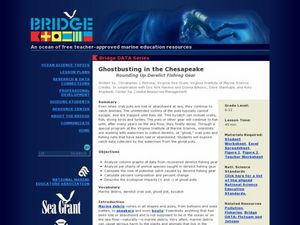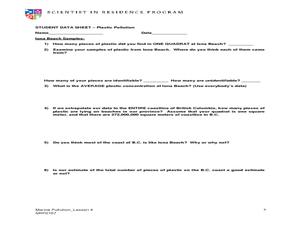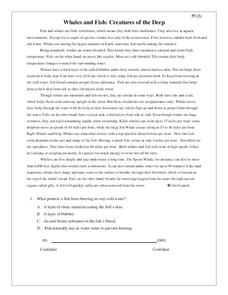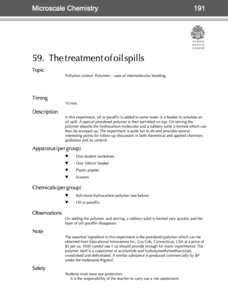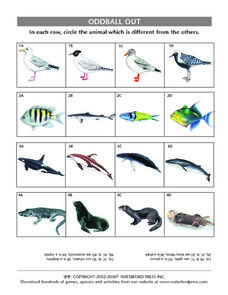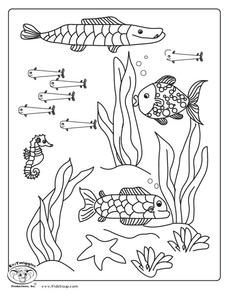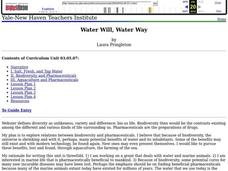Curated OER
Ghostbusting in the Chesapeake
Ghost pots, fishing gear lost during crabbing expeditions, continue to trap crabs that are never collected. Increase your budding ecologists' awareness of human impact on the environment as well as conservation efforts using this...
Curated OER
Specialized for the Sea
Students use pictures and make a mural to investigate how ocean animals are adapted to certain parts of their environment.
Curated OER
Under the Sea
Students imagine and describe fictitious sea animals that might live in the ocean. After reading an article, they reflect on new discoveries found in the ocean recently. Using the internet, they research the interdependence of animals...
National Geographic
Rescuing, Relocating, and Rehabilitating Wildlife
Bring up the Deepwater Horizon (BP) oil spill that occurred in the Gulf of Mexico in 2010. Display the colorful diagram of the coastal and marine organisms living in the area. Show a video about relocating the eggs of the Gulf's sea...
Curated OER
We of the Sea: Tribal Native American Stories
A video featuring members of Oregon’s Astoria Native American fishing community launches a study of the oral tradition of poetry, and how traditions are passed down within different cultures. Activities, assessments, extensions and...
Curated OER
Mathemafish Population
It's shark week! In this problem, young mathematically minded marine biologists need to study the fish population by analyzing data over time. The emphasis is on understanding the average rate of change of the population and drawing...
Consortium for Ocean Science Exploration and Engagement (COSEE)
Ocean Acidification: Whats and Hows
Open this activity by demonstrating the production of acidic carbon dioxide gas by activated yeast. Emerging ecologists then experiment with seashells to discover the effect of ocean acidification on shelled marine organisms. They...
Curated OER
Plastic Pollution
Learners determine with math concepts how much plastic pollution is affecting marine life. In this plastic pollution lesson plan, students collect scientific data from a field trip to a water treatment plant.
NOAA
Why is Hawaii's Ocean Important?
Studying the oceans? Focus on Hawaii's ocean with a resource packed with activity-based worksheets. Everything from products that come from the ocean to the abundance of plants and animals that call the ocean their home, Hawaii's ocean...
Curated OER
Zooplankton
Holoplankton are always plankton, whereas meroplankton are only plankton as larvae. Reveal several examples of each to your young marine biologists with this PowerPoint presentation. The first seven slides, an introduction to...
PreKinders
Ocean Word Cards
Dive into ocean vocabulary with a set of 29 picture word cards. Each card presents a picture of an animal or item from the ocean in vivid color, as well as its name.
National Wildlife Federation
Penguin Fun Facts
What's black and white and can dive up to 1,800 feet under water? That's right, penguins! Learn this and many other amazing facts about these unique birds with this handy reference sheet.
Curated OER
Phytoplankton
Tomorrow's marine biologists journey through the world of phytoplankton when viewing this slide show. They are exposed to the shapes and life cycle of diatoms, and introduced to dinoflagellates, coccolithophorids, and silicoflagellates....
Curated OER
Whales and Fish: Creatures of the Deep
Practice comparing and contrasting details in informational text with a reading passage about whales. It explains the ways that fish and whales are similar, as well as the ways they are different, and specific characteristics of various...
Royal Society of Chemistry
The Treatment of Oil Spills—Microscale Chemistry
When oil spills happen, how is the oil cleaned up? Pupils of polymer science discover an amazing substance that turns oil into a solid during a microscale experiment. Individuals observe oil or paraffin before and after addition of the...
Curated OER
The History of Life on Earth
Using meters as years, your class works together to map out the geologic time scale on a football field. Plenty of background information is included in this lesson plan as well as several resource links and a student worksheet. Your...
University of Waikato
Ocean Acidification and Eggshells
Eggshells and seashells have a lot in common. Learners use the similarities to conduct an experiment that models the effect of ocean acidification on marine animals. Using varying levels of acidic liquids, pupils make observations on the...
Curated OER
Ocean Word and Picture Matching
Students draw a line from 6 ocean animal names to their matching ocean life pictures on the right of the worksheet. This matching worksheet allows young students to work on an important visual skill.
Curated OER
Oddball Out: Birds, Fishes, Marine Mammals
In this science worksheet, pupils analyze 4 animal pictures in a row. Students circle the animal which is different from the others. There are 4 rows of pictures. Answers are provided upside down at the bottom of the page.
Curated OER
Ocean Life
In this coloring activity worksheet, students color the image of the underwater animals and plants. Students enhance their fine motor skills with the activity.
Curated OER
Blue Planet: Seas of Life - Tidal Seas
After viewing the video Blue Planet: Seas of Life, students review oceanic concepts. In this earth science lesson plan, students reflect on the effect tides have on living things and conduct research to create a "tidal trivia" game....
Curated OER
Oceans Life Quiz
In this oceans life quiz instructional activity, students complete an on-line quiz, clicking on questions and matching answers, scoring 1 point for each correct answer. A printed version is available.
NOAA
I Can't Breathe!
The Gulf of Mexico dead zone, an area of low oxygen that kills marine life, costs the United States $82 million every year. Young scientists research anoxic ocean environments then come up with a hypothesis for the cause of the Gulf of...
Curated OER
Water Will, Water Way
Students test tap water for hardness and mineral content. In this environmental science lesson plan, students identify the different stages of the water cycle. They classify plant and animals according to the rules of taxonomy.
Other popular searches
- Ocean Ecosystems Animals
- Grassland Animals Ocean
- Animals Ocean
- Animals in the Ocean
- Animals of the Ocean
- Ocean Plants and Animals


